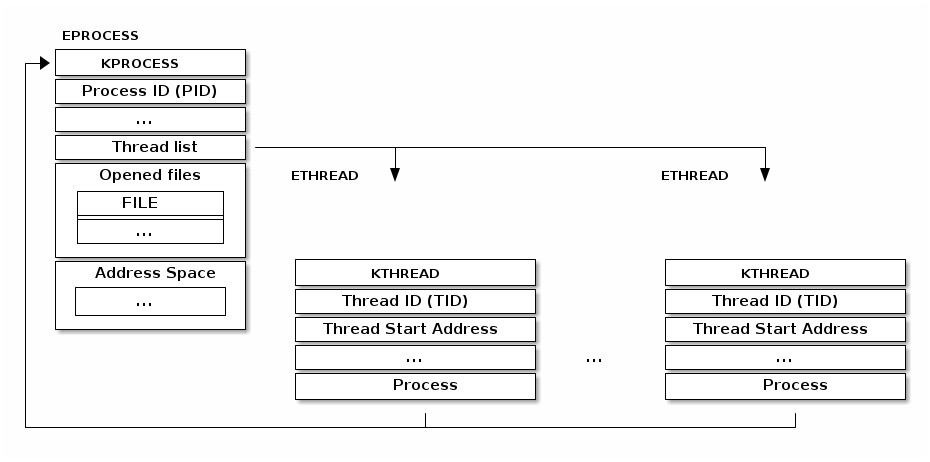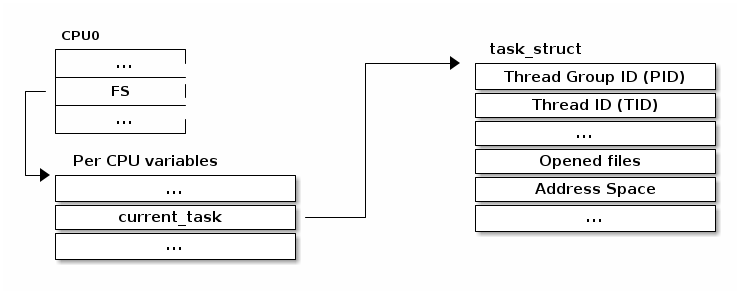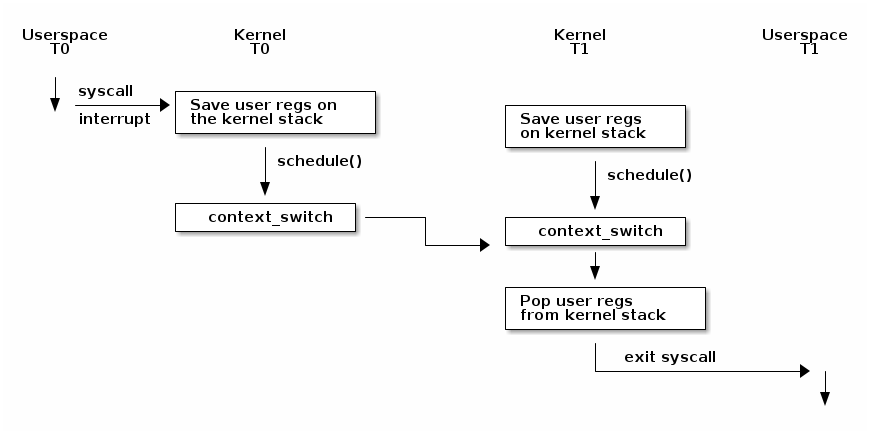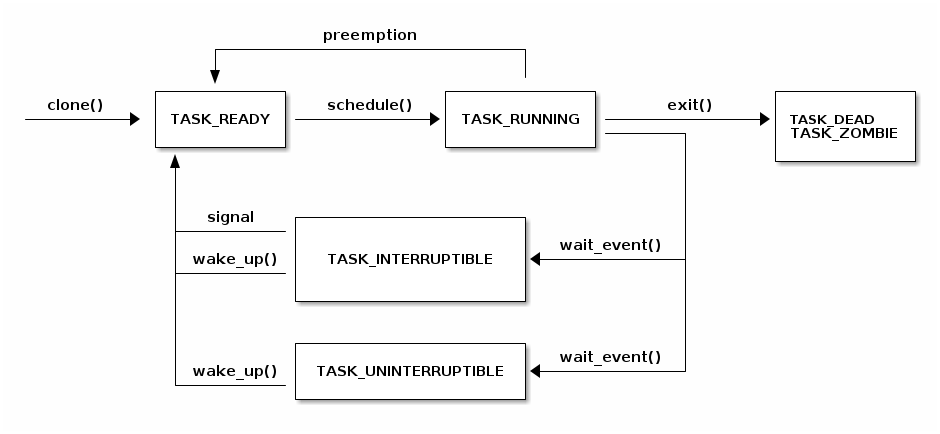Processes and threads
- Process and threads
- Context switching
- Blocking and waking up
- Process context
|
|
All this information is grouped in the Process Control Group
(PCB). In Linux this is struct task_struct.
+-------------------------------------------------------------------+
| dr-x------ 2 tavi tavi 0 2021 03 14 12:34 . |
| dr-xr-xr-x 6 tavi tavi 0 2021 03 14 12:34 .. |
| lrwx------ 1 tavi tavi 64 2021 03 14 12:34 0 -> /dev/pts/4 |
+--->| lrwx------ 1 tavi tavi 64 2021 03 14 12:34 1 -> /dev/pts/4 |
| | lrwx------ 1 tavi tavi 64 2021 03 14 12:34 2 -> /dev/pts/4 |
| | lr-x------ 1 tavi tavi 64 2021 03 14 12:34 3 -> /proc/18312/fd |
| +-------------------------------------------------------------------+
| +----------------------------------------------------------------+
| | 08048000-0804c000 r-xp 00000000 08:02 16875609 /bin/cat |
$ ls -1 /proc/self/ | 0804c000-0804d000 rw-p 00003000 08:02 16875609 /bin/cat |
cmdline | | 0804d000-0806e000 rw-p 0804d000 00:00 0 [heap] |
cwd | | ... |
environ | +----------->| b7f46000-b7f49000 rw-p b7f46000 00:00 0 |
exe | | | b7f59000-b7f5b000 rw-p b7f59000 00:00 0 |
fd --------+ | | b7f5b000-b7f77000 r-xp 00000000 08:02 11601524 /lib/ld-2.7.so |
fdinfo | | b7f77000-b7f79000 rw-p 0001b000 08:02 11601524 /lib/ld-2.7.so |
maps -----------+ | bfa05000-bfa1a000 rw-p bffeb000 00:00 0 [stack] |
mem | ffffe000-fffff000 r-xp 00000000 00:00 0 [vdso] |
root +----------------------------------------------------------------+
stat +----------------------------+
statm | Name: cat |
status ------+ | State: R (running) |
task | | Tgid: 18205 |
wchan +------>| Pid: 18205 |
| PPid: 18133 |
| Uid: 1000 1000 1000 1000 |
| Gid: 1000 1000 1000 1000 |
+----------------------------+
$ pahole -C task_struct vmlinux
struct task_struct {
struct thread_info thread_info; /* 0 8 */
volatile long int state; /* 8 4 */
void * stack; /* 12 4 */
...
/* --- cacheline 45 boundary (2880 bytes) --- */
struct thread_struct thread __attribute__((__aligned__(64))); /* 2880 4288 */
/* size: 7168, cachelines: 112, members: 155 */
/* sum members: 7148, holes: 2, sum holes: 12 */
/* sum bitfield members: 7 bits, bit holes: 2, sum bit holes: 57 bits */
/* paddings: 1, sum paddings: 2 */
/* forced alignments: 6, forced holes: 2, sum forced holes: 12 */
} __attribute__((__aligned__(64)));
Use the debugger to inspect the process named syslogd.


struct nsproxy has multiple namespaces each of which
can be selectively shared between groups of processesinit_net)
that are by default shared between new processes (e.g. list of
available network interfaces)Accessing the current process is a frequent operation:
struct task_struct's
file fieldstruct task_struct's
mm fieldcurrent macro is available to access to current
process's struct task_struct

/* how to get the current stack pointer from C */
register unsigned long current_stack_pointer asm("esp") __attribute_used__;
/* how to get the thread information struct from C */
static inline struct thread_info *current_thread_info(void)
{
return (struct thread_info *)(current_stack_pointer & ~(THREAD_SIZE – 1));
}
#define current current_thread_info()->task
What is the size of struct thread_info?
Which of the following are potential valid sizes for
struct thread_info: 4095, 4096, 4097?

static __always_inline struct rq *
context_switch(struct rq *rq, struct task_struct *prev,
struct task_struct *next, struct rq_flags *rf)
{
prepare_task_switch(rq, prev, next);
/*
* For paravirt, this is coupled with an exit in switch_to to
* combine the page table reload and the switch backend into
* one hypercall.
*/
arch_start_context_switch(prev);
/*
* kernel -> kernel lazy + transfer active
* user -> kernel lazy + mmgrab() active
*
* kernel -> user switch + mmdrop() active
* user -> user switch
*/
if (!next->mm) { // to kernel
enter_lazy_tlb(prev->active_mm, next);
next->active_mm = prev->active_mm;
if (prev->mm) // from user
mmgrab(prev->active_mm);
else
prev->active_mm = NULL;
} else { // to user
membarrier_switch_mm(rq, prev->active_mm, next->mm);
/*
* sys_membarrier() requires an smp_mb() between setting
* rq->curr / membarrier_switch_mm() and returning to userspace.
*
* The below provides this either through switch_mm(), or in
* case 'prev->active_mm == next->mm' through
* finish_task_switch()'s mmdrop().
*/
switch_mm_irqs_off(prev->active_mm, next->mm, next);
if (!prev->mm) { // from kernel
/* will mmdrop() in finish_task_switch(). */
rq->prev_mm = prev->active_mm;
prev->active_mm = NULL;
}
}
rq->clock_update_flags &= ~(RQCF_ACT_SKIP|RQCF_REQ_SKIP);
prepare_lock_switch(rq, next, rf);
/* Here we just switch the register state and the stack. */
switch_to(prev, next, prev);
barrier();
return finish_task_switch(prev);
}
#define switch_to(prev, next, last) \
do { \
((last) = __switch_to_asm((prev), (next))); \
} while (0)
/*
* %eax: prev task
* %edx: next task
*/
.pushsection .text, "ax"
SYM_CODE_START(__switch_to_asm)
/*
* Save callee-saved registers
* This must match the order in struct inactive_task_frame
*/
pushl %ebp
pushl %ebx
pushl %edi
pushl %esi
/*
* Flags are saved to prevent AC leakage. This could go
* away if objtool would have 32bit support to verify
* the STAC/CLAC correctness.
*/
pushfl
/* switch stack */
movl %esp, TASK_threadsp(%eax)
movl TASK_threadsp(%edx), %esp
#ifdef CONFIG_STACKPROTECTOR
movl TASK_stack_canary(%edx), %ebx
movl %ebx, PER_CPU_VAR(stack_canary)+stack_canary_offset
#endif
#ifdef CONFIG_RETPOLINE
/*
* When switching from a shallower to a deeper call stack
* the RSB may either underflow or use entries populated
* with userspace addresses. On CPUs where those concerns
* exist, overwrite the RSB with entries which capture
* speculative execution to prevent attack.
*/
FILL_RETURN_BUFFER %ebx, RSB_CLEAR_LOOPS, X86_FEATURE_RSB_CTXSW
#endif
/* Restore flags or the incoming task to restore AC state. */
popfl
/* restore callee-saved registers */
popl %esi
popl %edi
popl %ebx
popl %ebp
jmp __switch_to
SYM_CODE_END(__switch_to_asm)
.popsection
We are executing a context switch. Select all of the statements that are true.

/**
* wait_event - sleep until a condition gets true
* @wq_head: the waitqueue to wait on
* @condition: a C expression for the event to wait for
*
* The process is put to sleep (TASK_UNINTERRUPTIBLE) until the
* @condition evaluates to true. The @condition is checked each time
* the waitqueue @wq_head is woken up.
*
* wake_up() has to be called after changing any variable that could
* change the result of the wait condition.
*/
#define wait_event(wq_head, condition) \
do { \
might_sleep(); \
if (condition) \
break; \
__wait_event(wq_head, condition); \
} while (0)
#define __wait_event(wq_head, condition) \
(void)___wait_event(wq_head, condition, TASK_UNINTERRUPTIBLE, 0, 0, \
schedule())
/*
* The below macro ___wait_event() has an explicit shadow of the __ret
* variable when used from the wait_event_*() macros.
*
* This is so that both can use the ___wait_cond_timeout() construct
* to wrap the condition.
*
* The type inconsistency of the wait_event_*() __ret variable is also
* on purpose; we use long where we can return timeout values and int
* otherwise.
*/
#define ___wait_event(wq_head, condition, state, exclusive, ret, cmd) \
({ \
__label__ __out; \
struct wait_queue_entry __wq_entry; \
long __ret = ret; /* explicit shadow */ \
\
init_wait_entry(&__wq_entry, exclusive ? WQ_FLAG_EXCLUSIVE : 0); \
for (;;) { \
long __int = prepare_to_wait_event(&wq_head, &__wq_entry, state);\
\
if (condition) \
break; \
\
if (___wait_is_interruptible(state) && __int) { \
__ret = __int; \
goto __out; \
} \
\
cmd; \
} \
finish_wait(&wq_head, &__wq_entry); \
__out: __ret; \
})
void init_wait_entry(struct wait_queue_entry *wq_entry, int flags)
{
wq_entry->flags = flags;
wq_entry->private = current;
wq_entry->func = autoremove_wake_function;
INIT_LIST_HEAD(&wq_entry->entry);
}
long prepare_to_wait_event(struct wait_queue_head *wq_head, struct wait_queue_entry *wq_entry, int state)
{
unsigned long flags;
long ret = 0;
spin_lock_irqsave(&wq_head->lock, flags);
if (signal_pending_state(state, current)) {
/*
* Exclusive waiter must not fail if it was selected by wakeup,
* it should "consume" the condition we were waiting for.
*
* The caller will recheck the condition and return success if
* we were already woken up, we can not miss the event because
* wakeup locks/unlocks the same wq_head->lock.
*
* But we need to ensure that set-condition + wakeup after that
* can't see us, it should wake up another exclusive waiter if
* we fail.
*/
list_del_init(&wq_entry->entry);
ret = -ERESTARTSYS;
} else {
if (list_empty(&wq_entry->entry)) {
if (wq_entry->flags & WQ_FLAG_EXCLUSIVE)
__add_wait_queue_entry_tail(wq_head, wq_entry);
else
__add_wait_queue(wq_head, wq_entry);
}
set_current_state(state);
}
spin_unlock_irqrestore(&wq_head->lock, flags);
return ret;
}
static inline void __add_wait_queue(struct wait_queue_head *wq_head, struct wait_queue_entry *wq_entry)
{
list_add(&wq_entry->entry, &wq_head->head);
}
static inline void __add_wait_queue_entry_tail(struct wait_queue_head *wq_head, struct wait_queue_entry *wq_entry)
{
list_add_tail(&wq_entry->entry, &wq_head->head);
}
/**
* finish_wait - clean up after waiting in a queue
* @wq_head: waitqueue waited on
* @wq_entry: wait descriptor
*
* Sets current thread back to running state and removes
* the wait descriptor from the given waitqueue if still
* queued.
*/
void finish_wait(struct wait_queue_head *wq_head, struct wait_queue_entry *wq_entry)
{
unsigned long flags;
__set_current_state(TASK_RUNNING);
/*
* We can check for list emptiness outside the lock
* IFF:
* - we use the "careful" check that verifies both
* the next and prev pointers, so that there cannot
* be any half-pending updates in progress on other
* CPU's that we haven't seen yet (and that might
* still change the stack area.
* and
* - all other users take the lock (ie we can only
* have _one_ other CPU that looks at or modifies
* the list).
*/
if (!list_empty_careful(&wq_entry->entry)) {
spin_lock_irqsave(&wq_head->lock, flags);
list_del_init(&wq_entry->entry);
spin_unlock_irqrestore(&wq_head->lock, flags);
}
}
#define wake_up(x) __wake_up(x, TASK_NORMAL, 1, NULL)
/**
* __wake_up - wake up threads blocked on a waitqueue.
* @wq_head: the waitqueue
* @mode: which threads
* @nr_exclusive: how many wake-one or wake-many threads to wake up
* @key: is directly passed to the wakeup function
*
* If this function wakes up a task, it executes a full memory barrier before
* accessing the task state.
*/
void __wake_up(struct wait_queue_head *wq_head, unsigned int mode,
int nr_exclusive, void *key)
{
__wake_up_common_lock(wq_head, mode, nr_exclusive, 0, key);
}
static void __wake_up_common_lock(struct wait_queue_head *wq_head, unsigned int mode,
int nr_exclusive, int wake_flags, void *key)
{
unsigned long flags;
wait_queue_entry_t bookmark;
bookmark.flags = 0;
bookmark.private = NULL;
bookmark.func = NULL;
INIT_LIST_HEAD(&bookmark.entry);
do {
spin_lock_irqsave(&wq_head->lock, flags);
nr_exclusive = __wake_up_common(wq_head, mode, nr_exclusive,
wake_flags, key, &bookmark);
spin_unlock_irqrestore(&wq_head->lock, flags);
} while (bookmark.flags & WQ_FLAG_BOOKMARK);
}
/*
* The core wakeup function. Non-exclusive wakeups (nr_exclusive == 0) just
* wake everything up. If it's an exclusive wakeup (nr_exclusive == small +ve
* number) then we wake all the non-exclusive tasks and one exclusive task.
*
* There are circumstances in which we can try to wake a task which has already
* started to run but is not in state TASK_RUNNING. try_to_wake_up() returns
* zero in this (rare) case, and we handle it by continuing to scan the queue.
*/
static int __wake_up_common(struct wait_queue_head *wq_head, unsigned int mode,
int nr_exclusive, int wake_flags, void *key,
wait_queue_entry_t *bookmark)
{
wait_queue_entry_t *curr, *next;
int cnt = 0;
lockdep_assert_held(&wq_head->lock);
if (bookmark && (bookmark->flags & WQ_FLAG_BOOKMARK)) {
curr = list_next_entry(bookmark, entry);
list_del(&bookmark->entry);
bookmark->flags = 0;
} else
curr = list_first_entry(&wq_head->head, wait_queue_entry_t, entry);
if (&curr->entry == &wq_head->head)
return nr_exclusive;
list_for_each_entry_safe_from(curr, next, &wq_head->head, entry) {
unsigned flags = curr->flags;
int ret;
if (flags & WQ_FLAG_BOOKMARK)
continue;
ret = curr->func(curr, mode, wake_flags, key);
if (ret < 0)
break;
if (ret && (flags & WQ_FLAG_EXCLUSIVE) && !--nr_exclusive)
break;
if (bookmark && (++cnt > WAITQUEUE_WALK_BREAK_CNT) &&
(&next->entry != &wq_head->head)) {
bookmark->flags = WQ_FLAG_BOOKMARK;
list_add_tail(&bookmark->entry, &next->entry);
break;
}
}
return nr_exclusive;
}
int autoremove_wake_function(struct wait_queue_entry *wq_entry, unsigned mode, int sync, void *key)
{
int ret = default_wake_function(wq_entry, mode, sync, key);
if (ret)
list_del_init_careful(&wq_entry->entry);
return ret;
}
int default_wake_function(wait_queue_entry_t *curr, unsigned mode, int wake_flags,
void *key)
{
WARN_ON_ONCE(IS_ENABLED(CONFIG_SCHED_DEBUG) && wake_flags & ~WF_SYNC);
return try_to_wake_up(curr->private, mode, wake_flags);
}
/**
* try_to_wake_up - wake up a thread
* @p: the thread to be awakened
* @state: the mask of task states that can be woken
* @wake_flags: wake modifier flags (WF_*)
*
* Conceptually does:
*
* If (@state & @p->state) @p->state = TASK_RUNNING.
*
* If the task was not queued/runnable, also place it back on a runqueue.
*
* This function is atomic against schedule() which would dequeue the task.
*
* It issues a full memory barrier before accessing @p->state, see the comment
* with set_current_state().
*
* Uses p->pi_lock to serialize against concurrent wake-ups.
*
* Relies on p->pi_lock stabilizing:
* - p->sched_class
* - p->cpus_ptr
* - p->sched_task_group
* in order to do migration, see its use of select_task_rq()/set_task_cpu().
*
* Tries really hard to only take one task_rq(p)->lock for performance.
* Takes rq->lock in:
* - ttwu_runnable() -- old rq, unavoidable, see comment there;
* - ttwu_queue() -- new rq, for enqueue of the task;
* - psi_ttwu_dequeue() -- much sadness :-( accounting will kill us.
*
* As a consequence we race really badly with just about everything. See the
* many memory barriers and their comments for details.
*
* Return: %true if @p->state changes (an actual wakeup was done),
* %false otherwise.
*/
static int
try_to_wake_up(struct task_struct *p, unsigned int state, int wake_flags)
{
...
schedule() if neededpreempt_disable and
preempt_enableThe kernel is executing in process context when it is running a system call.
In process context there is a well defined context and we can
access the current process data with current
In process context we can sleep (wait on a condition).
In process context we can access the user-space (unless we are running in a kernel thread context).
Sometimes the kernel core or device drivers need to perform blocking operations and thus they need to run in process context.
Kernel threads are used exactly for this and are a special class of tasks that don't "userspace" resources (e.g. no address space or opened files).
What is the following change of the lx-ps script trying to accomplish?
diff --git a/scripts/gdb/linux/tasks.py b/scripts/gdb/linux/tasks.py
index 17ec19e9b5bf..7e43c163832f 100644
--- a/scripts/gdb/linux/tasks.py
+++ b/scripts/gdb/linux/tasks.py
@@ -75,10 +75,13 @@ class LxPs(gdb.Command):
def invoke(self, arg, from_tty):
gdb.write("{:>10} {:>12} {:>7}\n".format("TASK", "PID", "COMM"))
for task in task_lists():
- gdb.write("{} {:^5} {}\n".format(
+ check = task["mm"].format_string() == "0x0"
+ gdb.write("{} {:^5} {}{}{}\n".format(
task.format_string().split()[0],
task["pid"].format_string(),
- task["comm"].string()))
+ "[" if check else "",
+ task["comm"].string(),
+ "]" if check else ""))
LxPs()